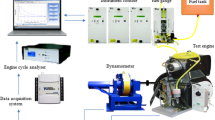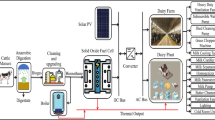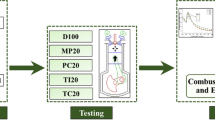Abstract
At present, the dual-loop organic Rankine cycle (DORC) is regarded as an important solution to engine waste heat recovery (WHR). Compared with the conventional exergy analysis, the advanced exergy analysis can better describe the interactions between system components and the irreversibility caused by economic or technical limitations. In order to systematically study the thermodynamic performance of DORC, the conventional and advanced exergy analyses are compared using an inline 6-cylinder 4-stroke turbocharged diesel engine. Meanwhile, the sensitivity analysis is implemented to further investigate the influence of operating parameters on avoidable-endogenous exergy destruction. The analysis result of conventional exergy analysis demonstrates that the priorities for the components that should be improved are in order of the high-temperature evaporator, the low-temperature turbine, the first low-temperature evaporator and the high-temperature condenser. The advanced exergy analysis result suggests that the avoidable exergy destruction values are the highest in the low-temperature turbine, the high-temperature evaporator and the high-temperature turbine because they have considerable endogenous-avoidable exergy destruction. The sensitivity analysis indicates that reducing the evaporation pinch point and raising the turbine efficiency can decrease the avoidable exergy destruction.
Similar content being viewed by others
Abbreviations
- E :
-
exergy/kW
- E D :
-
exergy destruction/kW
- E F :
-
the fuel exergy destruction/kW
- E P :
-
the product exergy destruction/kW
- e :
-
specific exergy/kJ·00kg−1
- h :
-
enthalpy/kJ·kg−1
- m :
-
mass flow rate/kg·s−1
- P :
-
pressure/kPa
- ΔP :
-
pressure drop/%
- Q :
-
heat transfer rate/kW
- s :
-
entropy/kJ·kg−1·K−1
- T :
-
temperature/K
- ΔT min :
-
the minimum temperature difference/K
- V ref :
-
reference value
- V est :
-
estimate value
- W :
-
power/kW
- y :
-
the exergy destruction ratio/%
- y * :
-
the exergy rate of fuel with the total exergy
- y * :
-
destruction/%
- HT:
-
high-temperature
- HTC:
-
high-temperature condenser
- HTE:
-
high-temperature evaporator
- HTP:
-
high-temperature pump
- HTT:
-
high-temperature turbine
- ICE:
-
Internal Combustion Engines
- LT:
-
low-temperature
- LTC:
-
low-temperature condenser
- LTE:
-
low-temperature evaporator
- LTP:
-
low -temperature pump
- LTT:
-
low-temperature turbine
- ORC:
-
Organic Rankine cycle
- WHR:
-
waste heat recovery
- ε :
-
exergy efficiency/%
- η :
-
efficiency/%
- 0:
-
ambient condition
- ch:
-
chemical
- D:
-
destroyed
- F:
-
fuel
- g:
-
gas
- in:
-
input
- K :
-
Kth component
- min:
-
minimum
- out:
-
output
- P:
-
production
- ph:
-
phsical
- t:
-
turbine
- w:
-
water
- AV:
-
avoidable
- EN:
-
endogenous
- EX:
-
exogenous
- real:
-
real conditions
- UN:
-
unavoidable
References
Shu G., Liu L., Tian H., et al., Parametric and working fluid analysis of a dual-loop organic Rankine cycle (DORC) used in engine waste heat recovery. Applied Energy, 2014, 113(1): 1188–1198.
Shu G., Liu L., Tian H., et al., Performance comparison and working fluid analysis of subcritical and transcritical dual-loop organic Rankine cycle (DORC) used in engine waste heat recovery. Energy Conversion & Management, 2013, 74(10): 35–43.
He M., Zhang X., Zeng K., et al., A combined thermodynamic cycle used for waste heat recovery of internal combustion engine. Energy, 2011, 36(12): 6821–6829.
Aghaali H., Angström H.E., A review of turbocompounding as a waste heat recovery system for internal combustion engines. Renewable & Sustainable Energy Reviews, 2015, 49: 813–824.
Saidur R., Rezaei M., Muzammil W.K., et al., Technologies to recover exhaust heat from internal combustion engines. Renewable & Sustainable Energy Reviews, 2012, 16(8): 5649–5659.
Tian H., Chang L., Gao Y., et al., Thermo-economic analysis of zeotropic mixtures based on siloxanes for engine waste heat recovery using a dual-loop organic Rankine cycle (DORC). Energy Conversion & Management, 2017, 136: 11–26.
Shi L., Shu G., Tian H., et al., A review of modified Organic Rankine cycles (ORCs) for internal combustion engine waste heat recovery (ICE-WHR). Renewable & Sustainable Energy Reviews, 2018, 92: 95–110.
Xu B., Rathod D., Yebi A., et al., A comprehensive review of organic Rankine cycle waste heat recovery systems in heavy-duty diesel engine application. Renewable & Sustainable Energy Reviews, 2019, 107: 145–170.
Peris B., Navarro-Esbrí J., Molés F., Bottoming organic Rankine cycle configurations to increase Internal Combustion Engines power output from cooling water waste heat recovery. Applied Thermal Engineering, 2013, 61(2): 364–371.
Xi H., Li M.J., Xu C., et al., Parametric optimization of regenerative organic Rankine cycle (ORC) for low grade waste heat recovery using genetic algorithm. Energy, 2013, 58(9): 473–482.
Zhang C., Shu G., Tian H., et al., Comparative study of alternative ORC-based combined power systems to exploit high temperature waste heat. Energy Conversion & Management, 2015, 89: 541–554.
Yang F., Dong X., Zhang H., et al., Performance analysis of waste heat recovery with a dual loop organic Rankine cycle (ORC) system for diesel engine under various operating conditions. Energy Conversion & Management, 2014, 80(2): 243–255.
Wang E., Yu Z., Zhang H., et al., A regenerative supercritical-subcritical dual-loop organic Rankine cycle system for energy recovery from the waste heat of internal combustion engines. Applied Energy, 2017, 190: 574–590.
Huang H., Zhu J., Yan B., Comparison of the performance of two different Dual-loop organic Rankine cycles (DORC) with nanofluid for engine waste heat recovery. Energy Conversion & Management, 2016, 126: 99–109.
Yao B., Yang F., Zhang H., et al., Analyzing the performance of a dual loop Organic Rankine Cycle system for waste heat recovery of a heavy-duty compressed natural gas engine. Energies, 2014, 7(11): 7794–7815.
Huang H., Zhu J., Deng W., et al., Influence of exhaust heat distribution on the performance of dual-loop organic Rankine Cycles (DORC) for engine waste heat recovery. Energy, 2018, 151: 54–65.
Nami H., Nemati A., Fard F.J., Conventional and advanced exergy analyses of a geothermal driven dual fluid organic Rankine cycle (ORC). Applied Thermal Engineering, 2017, 122: 59–70.
Galindo J., Ruiz S., Dolz V., et al., Advanced exergy analysis for a bottoming organic Rankine cycle coupled to an internal combustion engine. Energy Conversion & Management, 2016, 126: 217–227.
Koroglu T., Sogut O.S., Advanced exergoeconomic analysis of Organic Rankine Cycle waste heat recovery system of a marine power plant. International Journal of Thermodynamics, 2017, 3(20): 140–151.
Feng Y., Zhang Y., Li B., et al., Sensitivity analysis and thermoeconomic comparison of ORCs (organic Rankine cycles) for low temperature waste heat recovery. Energy, 2015, 82: 664–677.
Liu X., Wang X., Zhang C., Sensitivity analysis of system parameters on the performance of the Organic Rankine Cycle system for binary-cycle geothermal power plants. Applied Thermal Engineering, 2014, 71(1): 175–183.
Alihan K., Lecompte S., Lazova M., De Kerpel K., De Paepe M., Design sensitivity analysis of using various flow boiling correlations for a direct evaporator in high-temperature waste heat recovery ORCs. In 9th International Conference on Boiling and Condensation Heat Transfer, Proceedings. Boulder, Colorado, USA. 2015, website: http://hdl.handle.net/1854/LU-6855661.
Wang E.H., Zhang H.G., Zhao Y., et al., Performance analysis of a novel system combining a dual loop organic Rankine cycle (ORC) with a gasoline engine. Energy, 2012, 43(1): 385–395.
Zhang H.G., Wang E.H., Fan B.Y., A performance analysis of a novel system of a dual loop bottoming organic Rankine cycle (ORC) with a light-duty diesel engine. Applied Energy, 2013, 102(2): 1504–1513.
Dong X.R., Yang F.B., Zhang H.G., et al., Performance analysis of a dual loop Organic Rankine Cycle for vehicle diesel engine under various operating conditions. Transactions of Beijing Institute of Technology, 2015, 35(5): 471–476.
Shu G., Liu L., Tian H., et al., Analysis of regenerative dual-loop organic Rankine cycles (DORCs) used in engine waste heat recovery. Energy Conversion & Management, 2013, 76(6): 234–243.
Anvari S., Saray R.K., Bahlouli K., Conventional and advanced exergetic and exergoeconomic analyses applied to a tri-generation cycle for heat, cold and power production. Energy, 2015, 91: 925–939.
Soltani S., Yari M., Mahmoudi S.M.S., et al., Advanced exergy analysis applied to an externally-fired combined-cycle power plant integrated with a biomass gasification unit. Energy, 2013, 59: 775–780.
Colorado D., Advanced exergy analysis applied to a single-stage heat transformer. Applied Thermal Engineering, 2017, 116: 584–596.
Fallah M., Mahmoudi S.M.S., Yari M., et al., Advanced exergy analysis of the Kalina cycle applied for low temperature enhanced geothermal system. Energy Conversion & Management, 2016, 108: 190–201.
Wang Z., Xiong W., Ting S.K., et al., Conventional and advanced exergy analyses of an underwater compressed air energy storage system. Applied Energy, 2016, 180: 810–822.
Acknowledgments
This work was supported by the Science and Technology Major Project of Tibet of China (Grant No. XZ201801-GA-03) and the Natural Science Foundation of Hunan Province, China (Grant No. 2018JJ2399).
Author information
Authors and Affiliations
Corresponding author
Rights and permissions
About this article
Cite this article
Wang, Z., Hu, Y. & Xia, X. Comparison of Conventional and Advanced Exergy Analysis for Dual-Loop Organic Rankine Cycle used in Engine Waste Heat Recovery. J. Therm. Sci. 30, 177–190 (2021). https://doi.org/10.1007/s11630-020-1299-x
Received:
Published:
Issue Date:
DOI: https://doi.org/10.1007/s11630-020-1299-x




